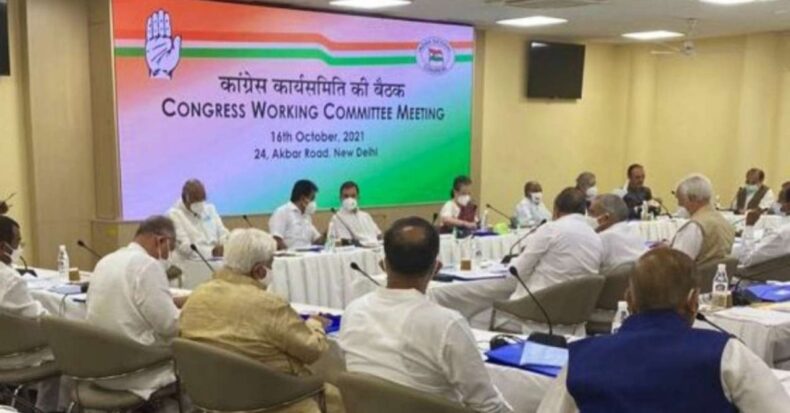The Congress Working Committee (CWC), the party’s highest body, met on October 16 at the AICC headquarters in New Delhi. The meeting’s main focus was internal elections, the present political crisis, particularly the Lakhimpur unrest and recent defections.
On Saturday, 57 members, including three Chief Ministers, met in Delhi for the highest Congress body meet, the Congress Working Committee (CWC).
The CWC endorsed a resolution accusing the Narendra Modi government of unleashing violence on farmers protesting, carrying out state-sponsored attacks on minority populations, and assaulting the country’s democratic institutions.
It also stated that Congress is concerned about the country’s rapid deterioration in security and that the economy’s decline is a critical issue.
Meanwhile, the party said that the election for the new Congress president would be between August 21 and September 20 next year, following a meeting that confirmed the timeline for organizational polls at various levels.
The CWC resolution:
The Congress Working Committee resolution asserted that the protest by farmers against the three black laws on agriculture continued after ten months.
A haughty administration has refused to engage the farmers in dialogue and has stood by as a bystander as the police and renegade BJP members have inflicted violence on them.
The unfortunate episode in Lakhimpur Kheri is a striking example of government assistance to silence farmers’ voices. The Prime Minister’s failure to denounce the farmers’ brutal murders and fire the Minister of State for Home Affairs has outraged the country’s conscience.
It says that the CWC is concerned about state-sponsored attacks on Scheduled Castes, Scheduled Tribes, minorities, and women to intimidate them and deny them their rights. All such lumpen groups will be fought bravely and forcefully by the Congress Party, which will defend the rights of all our citizens.
The CWC stated that it is “its duty to sound the alarm bells” and urged all democratic parties to unite against the Modi government at a time when the country’s economy and democratic institutions are in shambles, and there are numerous security dangers.
Electoral autocracy:
The CWC resolution added that the attack on democratic institutions brings the Modi government’s tragic and dishonest narrative to a close. India is not a democracy now; instead, it is an electoral autocracy.
The judiciary has weakened as a result of the failure to fill vacancies in courts and tribunals. Independent watchdog bodies such as the Information Commission, the Election Commission, and the Human Rights Commission have been stripped of their legitimacy and reduced to cyphers.
Raids and bogus charges to intimidate the media into obedience. Intimidating non-governmental organizations (NGOs) and halting their humanitarian efforts.
The country is also facing security concerns, according to the resolution, with the border conflict with China showing no signs of abating, as well as internal threats coming from the situation in Jammu and Kashmir and the northeast.
Internal elections:
Meanwhile, KC Venugopal, the Congress’ general secretary (organization), unveiled the election timeline, which includes a large membership drive beginning November 1, 2021, lasting until March 31, 2022.
The election of PCC presidents, vice presidents, treasurers, PCC executives, and AICC members by the PCC general body would take place between July 21 and August 20, 2022, according to Venugopal. He stated that the election for Congress president will take place between August 21 and September 20, 2022.
Venugopal also said that AICC members would elect CWC members and other bodies at a plenary session. Members will register for the organizational polls for Rs 5 from November 1 to March 31, 2022, with district Cong committees publishing the preliminary list of members by March 31.
An orientation program for state trainers and in-charges will occur from November 12 to 15 in Sevagram, Wardha. Venugopal further mentioned that the CWC has resolved that from November 14 to November 29, Congress will engage in nationwide agitation against price increases.
The active president:
Sonia Gandhi had previously stated at the CWC meeting that she is a “full-time and hands-on party president.” She said, “I am, if you would allow me to say so, a full-time and hands-on Congress President,” Sonia remarked, apparently in response to concerns from some G-23 leaders that the party needed an active president.
Numerous officials have reminded the Gandhis that nothing has changed on the ground, and Congress’s downward spiral continues even as it deals with state-level instability from Punjab to Chhattisgarh.
Amarinder Singh, Sushmita Dev, and Luizinho Faleiro are many leaders who have left the Congress. When Jyotiraditya Scindia, one of Rahul Gandhi’s closest confidantes, shifted to the BJP last year, the nosebleed began, and Jitin Prasada followed suit earlier this year.
The party has failed to reconcile the conflict between Ashok Gehlot and Sachin Pilot in Rajasthan.













